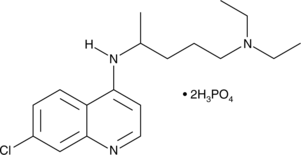Description
An aminoquinoline; an inhibitor of autophagy with antimalarial, anti-inflammatory, anticancer, and antiviral activities; inhibits autophagosome-lysosome fusion in HeLa cells at 100 µM; active against the chloroquine-sensitive GC03 strain of P. falciparum (IC50 = 29.2 nM); prevents SARS-CoV-2 infection in Vero cells (EC50 = 1.13 µM) but does not inhibit SARS-CoV replication in the lungs in a mouse model of SARS-CoV infection; inhibits the growth of human SSC25 and CAL 27 oral squamous cell carcinoma cells (IC50s = 29.9 and 17.3 µM, respectively), as well as A498, SN12C, RXF393, and 769-P renal cancer cells (IC50s = 16, 62, 81, and 25 µM, respectively); reduces tumor growth in a CAL 27 mouse xenograft model and a 4T1 mouse allograft model at 50 mg/kg
Formal name: N4-(7-chloro-4-quinolinyl)-N1,N1-diethyl-1,4-pentanediamine, diphosphate
Synonyms: DL-Chloroquine|NSC 14050
Molecular weight: 515.9
CAS: 50-63-5
Purity: ≥95%
Formulation: A crystalline solid
Product Type|Biochemicals|Antiparasitics|Antiprotozoals||Product Type|Biochemicals|Antivirals||Research Area|Cancer|Autophagy||Research Area|Cardiovascular System|Heart||Research Area|Cell Biology|Endomembrane System & Vesicular Trafficking|Autophagy||Research Area|Immunology & Inflammation|Autoimmunity|Lupus||Research Area|Immunology & Inflammation|Autoimmunity|Rheumatoid Arthritis||Research Area|Immunology & Inflammation|Pulmonary Diseases|COVID-19||Research Area|Infectious Disease|Parasitic Diseases|Malaria||Research Area|Infectious Disease|Viral Diseases|Coronaviruses



